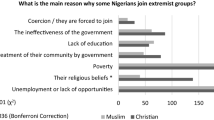Abstract
Our article contributes to the evolving international debate about global Islamist terrorism. According to our data, in the last four decades between 1979 and 2019 more than 160.000 people lost their lives in acts of Islamist terrorism across the globe. Islamist terrorism reached its peak in 2016, and in the period between 1979 and 2019, there were 2,3 terrorist attacks per day, with a daily fatality rate of 11,4 people. The Islamist terrorist organizations (in descending order) Islamic State and affiliates incl. Khorasan, Sinai, and Tripoli; Taliban; Boko Haram; Al-Qaida and affiliates; and Al-Shabaab killed more than 10.000 persons each, and there were more than 1.000 victims from the following nationalities: Iraq, Afghanistan, Nigeria, Syria, Pakistan, Somalia, Algeria, Yemen, United States, India, Egypt, Niger, Cameroon, Philippines, Libya, Israel, Russia, and Kenya. Islamist terrorism, apart from the national and international security establishments of the affected countries, mainly attacked private citizens and property, businesses, religious figures/institutions, transportation, educational institutions, airports and aircraft, utilities, journalists and media, tourists, maritime facilities, NGOs, and food or water supplies. The latest freely available PEW global surveys data suggest that average population-weighted terror support rates (Pew Research Global Attitudes Project Spring 2013) on Muslim favourability of Hamas, Hezbollah, the Taliban, al Qaeda, and suicide bombing is 17.38% of all Muslims around the globe. Our data are based on representative samples of the Muslim populations in 23 countries, comprising at least 56.6% of the global Muslim population, now estimated to be 1.9 billion people. Without considering the age structure, we can start from the assumption that Islamist radicalism is based in a milieu of 330 million people. What explains such attitudes of supporting such murderous acts by millions and millions of ordinary Muslim citizens of our globe? Based on a multivariate analysis of the fairly inclusive and extensive PEW 2012-Pew-Religion-Worlds-Muslims dataset we arrive at the conclusion that restrictive gender norms are the decisive factor leading to the support of terrorist activities.
Access this chapter
Tax calculation will be finalised at checkout
Purchases are for personal use only
Similar content being viewed by others
Literature
Berman, Russell A., and Arno Tausch. Support for Terrorism in Muslim Majority Countries and Implications for Immigration Policies in the West. Strategic Assessment 20.1 (2017): 7–21.
Grinin, Leonid, Andrey Korotayev, and Arno Tausch. Islamism, Arab Spring, and the Future of Democracy. Cham, Switzerland: Springer (2018).
http://english.dohainstitute.org/release/5083cf8e-38f8-4e4a-8bc5-fc91660608b0.
http://www.pewforum.org/2013/04/30/the-worlds-muslims-religion-politics-society-overview/ (download March 28, 2020).
https://en.wikipedia.org/wiki/List_of_Arab_countries_by_population.
https://en.wikipedia.org/wiki/Middle_East_Review_of_International_Affairs.
https://www.inss.org.il/publication/updated-strategic-survey-for-israel/.
Juergensmeyer, Mark. Terror in the Mind of God: The Global Rise of Religious Violence (Vol. 13). University of California Press, 2017
Lewis, Bernhard, and Buntzie Ellis Churchill. Islam: The Religion and the People. Indianapolis: Wharton Press, 2009
PEW Research, Global Attitudes Project, Concerns about Islamic Extremism on the Rise in Middle East. Negative Opinions of al Qaeda, Hamas and Hezbollah Widespread. (PEW Global Attitudes Project, Washington, DC, 2014 available at: http://www.pewglobal.org/2014/07/01/concerns-about-islamic-extremism-on-the-rise-in-middle-east/).
Rehman, Scheherazade S., and Hossein Askari. How Islamic Are Islamic Countries? Global Economy Journal 10.2 (2010), Article 2: 1–37.
Röhrich, Wilfried. Die Politisierung des Islam: Islamismus und Dschihadismus. Springer-Verlag, 2015.
Schneider, Friedrich, Tilman Brück, and Daniel Meierrieks. The Economics of Counterterrorism: A Survey. Journal of Economic Surveys 29.1 (2015): 131–157.
Solomon, Hussein, and A. Arno Tausch. Arab MENA Countries: Vulnerabilities and Constraints Against Democracy on the Eve of the Global Covid-19 Crisis. Cham: Springer, 2021
Solomon, Hussein, and A. Arno Tausch. Islamism, Crisis and Democratization: Implications of the World Values Survey for the Muslim World. Cham: Springer, 2020
Solomon, Hussein. Islamic State and the Coming Global Confrontation. Springer, 2016
Tausch, Arno, Almas Heshmati, and Hichem Karoui. The Political Algebra of Global Value Change: General Models and Implications for the Muslim World. New York: Nova Science Publishers, 2014.
Tausch, Arno. Islamism: Global Surveys and Implications for the Future of the Arab Countries. New York: Nova Science Publishers, 2021
Tausch, Arno. Better Look the Other Way? Islamism and Gender Issues in the Muslim World. Telos (Spring 2017): 217–231.
Tausch, Arno. The Fertile Grounds for ISIL Terrorism. Telos (Summer 2015): 54–75.
Tessler, Mark. Do Islamic Orientations Influence Attitudes Toward Democracy in the Arab World? Evidence from Egypt, Jordan, Morocco, and Algeria, International Journal of Comparative Sociology 43.3–5 (2002): 229–249.
Tessler, Mark, et al. The Evaluation and Application of Survey Research in the Arab World. Routledge, 2019
Tessler, Mark. Islam and Democracy in the Middle East: The Impact of Religious Orientations on Attitudes Toward Democracy in Four Arab Countries. Comparative Politics (2002): 337–354
Tessler, Mark. Islam and Politics in the Middle East: Explaining the Views of Ordinary Citizens. Indiana University Press, 2015.
Tibi, Bassam. Islamism and Islam. Yale University Press, 2012.
Tibi, Bassam. The Challenge of Fundamentalism: Political Islam and the New World Disorder. University of California Press, 2002
UNDP Human Development Report. New York and London: Oxford University Press, 2019.
Author information
Authors and Affiliations
Editor information
Editors and Affiliations
Rights and permissions
Copyright information
© 2021 The Author(s), under exclusive license to Springer Nature Singapore Pte Ltd.
About this chapter
Cite this chapter
Tausch, A. (2021). Social Attitudes Fuelling Islamist Terrorism. In: Solomon, H. (eds) Directions in International Terrorism. Palgrave Macmillan, Singapore. https://doi.org/10.1007/978-981-16-3380-5_9
Download citation
DOI: https://doi.org/10.1007/978-981-16-3380-5_9
Published:
Publisher Name: Palgrave Macmillan, Singapore
Print ISBN: 978-981-16-3379-9
Online ISBN: 978-981-16-3380-5
eBook Packages: Political Science and International StudiesPolitical Science and International Studies (R0)




